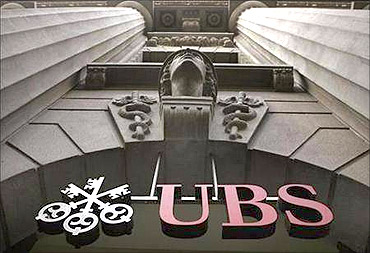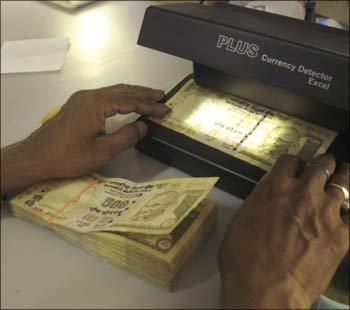 | « Back to article | Print this article |
Black money: What have you done so far, SC asks govt
The Supreme Court on Thursday slammed the government again over the issue of illicit wealth parked in foreign banks, asking it to file a report on the action taken by it against people and firms that have stashed black money in tax havens abroad.
Expressing concern that the black money stashed in banks abroad might have originated from arms deals, drug trafficking and smuggling, the Supreme Court asked the government as to what action it had taken against individuals and firms having foreign accounts.
A bench headed by Justice B Sudarshan Reddy directed the government to file its response by Thursday next.
The court also sought replies from the government, the Reserve Bank of India and the Chief Vigilance Commission of India on a petition seeking direction to the government to ratify UN convention on corruption which would facilitate in bringing back black money from foreign banks.
Asking the government not to restrict its probe only to the tax evasion aspect, the bench told the government to go after the sources of black money.
"We want to know what steps you have taken against the people who have accumulated so much money in foreign banks. What are the sources of the money," the bench asked.
"These are people in the country who are amenable to the law. What action have you taken against them when you came to know that they have stashed money in foreign banks? What are the sources of the money? Where has the money come from? It might be because of arms deals, smuggling, narcotics, drug trafficking or something else. These are more serious issues, when you know the name, what action you have taken?" the bench asked.
Click NEXT to read on . . .
Black money: What have you done so far, SC asks govt
"That is a serious matter which we are concerned about. You know the names, (you know) where the money is lying, still you are talking about double taxation issue," the bench said when Solicitor General Gopal Subramanium submitted that the government is taking all actions under Double Taxation Avoidance Agreement (DTAA) against the people who have stashed money in foreign banks.
"Looking at the issue from the taxation point of view is just one aspect but there are other serious matters associated with the black money which we are concerned about," the bench said.
The government, however, submitted that it is taking action under international agreements and the law against the erring persons and it has no problems in sharing the information with the court.
The solicitor general submitted that many agencies are working on the case and investigation is going on.
Senior advocate Anil Divan, appearing for petitioner and former Union Law Minister Ram Jethmalani, accused the government of not being serious on the issue, saying that Pune-based businessman Hassan Ali, facing probe for his foreign bank accounts, has fled the country.
Click NEXT to read on . . .
Black money: What have you done so far, SC asks govt
The court, after hearing Divan, asked the government to find out whether Ali is present in the country or has left it.
The court after hearing the arguments posted the matter for further hearing on Thursday.
The court was hearing a petition filed by Jethmalani seeking direction to the government to bring back black money stashed in foreign banks which, according to him, amounted to around $1 trillion.
The Apex Court had on January 19, while hearing the matter, had expressed displeasure over the government's reluctance in coming forward with full information on the black money issue, saying keeping national wealth abroad amounted to "plunder" of the country.
"It is a pure and simple theft of the national money. We are talking about mind-boggling crime. We are not on the niceties of various treaties," the court had remarked.
Click NEXT to read on . . .
Black money: What have you done so far, SC asks govt
The remark by the bench had been made when the solicitor general was explaining various steps taken by the government under the Double Taxation Avoidance Act.
The court had expressed unhappiness that the government had filed an affidavit restricting information relating to the money deposited by 26 persons in Liechtenstein Bank in Germany.
On Tuesday, Union Finance Minister Pranab Mukherjee had said that the Indian government had nothing to hide, but the names (of those who have stashed black money abroad) "cannot be revealed as it violates international law".
Addressing a press conference in New Delhi, while outlining the government's strategy to tackle the menace of black money and on the stashing of illicit wealth overseas, the finance minister had said that there are no reliable estimates of black money generated by Indians within and outside the country, but it is roughly estimated at being between Rs 500 billion and Rs 1,400 billion.
He said that the various estimates of black money are only unverifiable assumptions and approximations.
Click NEXT to read on . . .
Black money: What have you done so far, SC asks govt
"No information can be made available from any other sovereign government unless there is a legal framework. We are not hiding behind the double taxation avoidance pacts," said the finance minister.
The finance minister dismissed the criticism that it was not disclosing information because such disclosure could result in the government's fall.
Asserting that the government was "not afraid of the danger to the coalition in not disclosing the names of black money holders abroad," Mukherjee asserted: "We will complete our full term."
The finance minister outlined the government's plan to tackle the scourge of black money and the stashing away of illicit wealth abroad.
He said the government has formulated a five-pronged strategy. This includes:
1. Joining the global crusade against 'black money';
2. Creating an appropriate legislative framework;
3. Setting up institutions for dealing with illicit funds;
4. Developing systems for implementation; and
5. Imparting skills to the manpower for effective action.
Click NEXT to read on . . .
Black money: What have you done so far, SC asks govt
Unfazed by attacks buy the Opposition parties and the questions from the Supreme Court, the government continued to maintain that the absence of legal framework keeps it from disclosing any information received from foreign entities on black money held by Indians abroad.
"The problem is information which we have obtained has come under some conditions of secrecy. Today, if we disclose, tomorrow other countries will not give me the information raising an accusing finger that you do not meet international commitments," he said.
Elaborating on his statements, the finance minister said that Swiss banks refuse to divulge information on black money.
"We cannot break any international commitments on black money holders because governments will not be ready to part information with us," he added.
He also said that "no information can be made available unless there is legal framework and no sovereign country is going to share information on black money."





